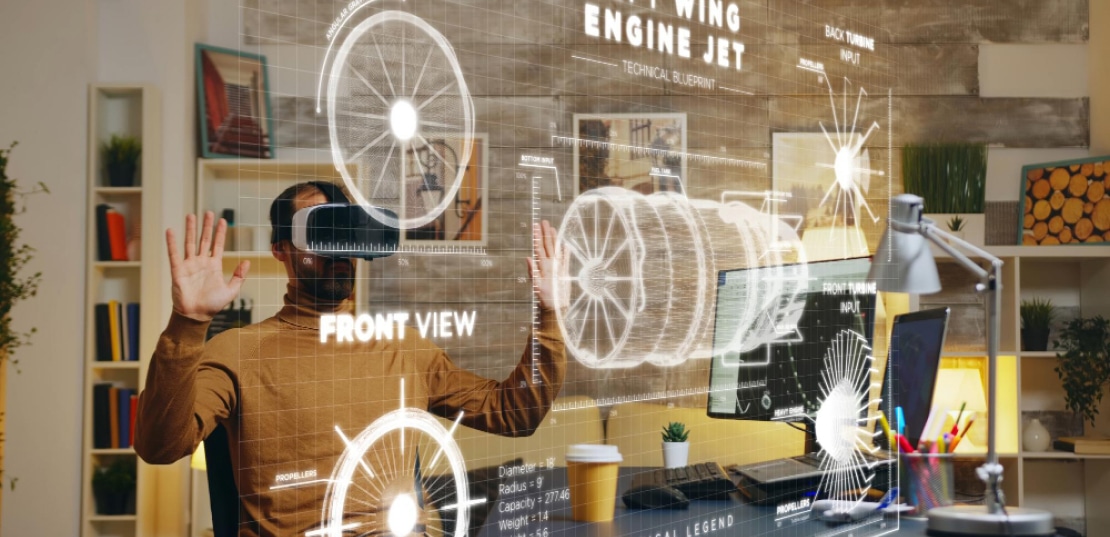
In the dynamic realm of B2B eCommerce, the only constant is change. As the company and digital landscape continues to evolve, B2B e-commerce sellers must stay ahead of the curve by embracing innovative technologies to maintain competitiveness and meet the evolving needs of their customers. With the rapid rise of mobile commerce and shifting consumer behaviors, the imperative to adapt and innovate has never been greater. In this blog post, we will explore six essential B2B technologies in 2024, that are on an upwards trend, that B2B sellers should add to their arsenal in 2024 to thrive in this everchanging mobile commerce landscape and secure their position in the market.
Artificial Intelligence (AI) and Machine Learning (ML) Integration Role In B2B Tech

AI and ML are transforming both Customer experiences and backend operations for B2B sellers. In addition to personalized recommendations and predictive analytics for online shopping, they optimize inventory management, automate processes, streamline logistics, and automate tasks. AI-driven demand forecasting and supply chain optimization minimize stockouts, cut carrying costs, and enhance operational efficiency.
AI-powered chatbots further augment customer support by delivering instant assistance, resolving queries, and enabling order tracking, thereby bolstering customer satisfaction and loyalty. This integration not only improves efficiency but also drives growth in the competitive B2B social commerce and online selling landscape. By harnessing the power of AI and ML, B2B sellers can gain actionable insights, mitigate risks, and adapt swiftly to evolving market demands, ensuring long-term success in the dynamic digital marketplace.
Advanced Analytics and Business Intelligence Tools:
In addition to extracting insights from historical customer data, Advanced Analytics and Business Intelligence tools enable proactive decision-making and scenario planning for B2B sellers. By harnessing predictive analytics models and prescriptive analytics capabilities, B2B sellers can anticipate market trends, identify emerging opportunities, and mitigate potential risks. Moreover, data visualization tools empower stakeholders to interpret complex data sets quickly and communicate actionable insights effectively.
Real-time reporting dashboards further facilitate agile decision-making by providing up-to-date performance metrics and KPIs, enabling B2B sellers to respond swiftly to changing market dynamics and customer demands. As technology advances, for example, the integration of AI and ML into these analytics tools promises even deeper insights and more accurate predictions, driving continuous improvement and innovation in B2B operations, marketing efforts and sales strategies.
Blockchain Technology for Supply Chain Management
Blockchain technology offers more than just transparency and traceability in digital commerce, it fundamentally transforms trust and collaboration within B2B supply chains. Beyond tracking product provenance and ensuring authenticity, blockchain-based smart contracts automate contractual agreements and enforce compliance with predefined terms and conditions. Moreover, decentralized ledgers enable secure and tamper-proof record-keeping, reducing the risk of fraud and disputes in complex supply networks.
By leveraging blockchain for supply chain financing, inventory financing, and even sustainability tracking, B2B sellers can improve access to liquidity, optimize working capital, and forge stronger partnerships with suppliers and distributors. This comprehensive integration of blockchain technologies not only enhances sales channels and operational efficiency but also fosters a business model and a more sustainable and resilient supply chain ecosystem, positioning B2B sellers for long-term success in the global marketplace.
Augmented Reality (AR) and Virtual Reality (VR) Experiences

Augmented Reality (AR) and Virtual Reality (VR) technologies offer immersive product experiences that transcend traditional marketing channels and social media platforms. In addition to enhancing product visualization and customization, AR and VR simulations enable B2B sellers to conduct virtual product demonstrations and training sessions, minimizing the reliance on physical prototypes and onsite visits. Interactive AR applications facilitate collaborative design reviews and prototyping sessions, accelerating the product development cycle and fostering innovation within organizations.
By seamlessly integrating AR and VR experiences into their eCommerce platforms, B2B sellers can differentiate themselves from competitors, amplify brand engagement, and drive higher conversion rates. Ultimately, these technologies deliver unparalleled value to their customers and stakeholders, solidifying their position as industry leaders in the ever-evolving landscape of B2B eCommerce.
Internet Of Things (IoT) Integration for Smart Commerce

The Internet of Things (IoT) extends beyond connectivity and mobile devices; it enables intelligent automation and predictive maintenance for B2B sellers. In addition to real-time inventory tracking and asset monitoring, IoT-enabled sensors can collect valuable data on product usage, performance, and environmental conditions. Predictive maintenance algorithms leverage this data to identify potential equipment failures before they occur, minimizing downtime and maximizing productivity for new customers.
Furthermore, IoT devices facilitate seamless omnichannel experiences by enabling location-based marketing and personalized promotions based on customer preferences and proximity to various online platforms, retailers, physical stores, or distribution centers. This integration of IoT technologies not only optimizes operational efficiency but also enhances customer engagement and drives sales growth in an increasingly connected digital ecosystem. By leveraging IoT-enabled devices, brands and B2B sellers can deliver tailored experiences and anticipate customer needs, ultimately gaining a competitive edge in the evolving marketplace. Additionally, analyzing customer behavior on eCommerce sites through IoT data allows for more targeted marketing strategies and personalized customer experiences, further solidifying the brand’s position in the market.
Voice Commerce and Conversational Commerce Solutions
Voice Commerce and Conversational Commerce redefine the way B2B buyers interact with suppliers and place orders in online stores. In addition to voice-enabled ordering and reordering, conversational AI platforms facilitate natural language conversations between businesses and online shoppers, understanding complex queries and providing personalized recommendations. Furthermore, chatbots and virtual assistants offer 24/7 support, guiding customers through the purchasing process, answering product-related questions, and resolving issues in real-time. By integrating voice commerce and conversational commerce solutions into their eCommerce platforms, B2B sellers can enhance customer engagement, improve operational efficiency, and drive sales growth in an increasingly conversational digital marketplace. This results in online retailers providing personalized shopping experiences, fostering customer loyalty and satisfaction.
Moreover, as voice recognition technology continues to advance, B2B sellers can explore new opportunities for voice-driven marketing campaigns, targeted promotions, and voice-controlled interfaces. By leveraging voice data analytics and sentiment analysis, B2B sellers can gain deeper insights into customer preferences, sentiment, and purchasing behavior, enabling more personalized and contextualized customer interactions throughout. Additionally, voice commerce opens up new avenues for cross-selling and upselling opportunities, as virtual assistants can proactively suggest and sell complementary products or services based on the customer’s needs and preferences. As the adoption of voice-enabled devices and virtual assistants continues to rise, B2B sellers must capitalize on this trend to stay ahead of the competition and deliver superior customer experiences in the digital age.
Embracing Innovation: Pioneering The Future of eCommerce Using B2B Technolgies
 The landscape of B2B eCommerce is constantly evolving, driven by technological innovations and shifting customer expectations. To stay ahead of the curve in 2024 and beyond, B2B sellers must embrace cutting-edge technologies, such as Artificial Intelligence, Blockchain, Augmented Reality, IoT, and Voice Commerce, to deliver seamless customer experiences, optimize operational efficiencies, and drive business growth. By investing in these essential technologies and staying agile in their approach, B2B sellers can thrive in the everchanging landscape of B2B eCommerce and maintain a competitive advantage and edge in the digital marketplace. Additionally, the utilization of first-party customer data enables B2B sellers to tailor their offerings and interactions, ultimately leading to increased customer satisfaction and loyalty amidst the evolving landscape of B2B eCommerce. Embracing these advancements positions B2B sellers for long-term success and ensures they remain at the forefront of industry trends, emerging technologies, and customer preferences.
The landscape of B2B eCommerce is constantly evolving, driven by technological innovations and shifting customer expectations. To stay ahead of the curve in 2024 and beyond, B2B sellers must embrace cutting-edge technologies, such as Artificial Intelligence, Blockchain, Augmented Reality, IoT, and Voice Commerce, to deliver seamless customer experiences, optimize operational efficiencies, and drive business growth. By investing in these essential technologies and staying agile in their approach, B2B sellers can thrive in the everchanging landscape of B2B eCommerce and maintain a competitive advantage and edge in the digital marketplace. Additionally, the utilization of first-party customer data enables B2B sellers to tailor their offerings and interactions, ultimately leading to increased customer satisfaction and loyalty amidst the evolving landscape of B2B eCommerce. Embracing these advancements positions B2B sellers for long-term success and ensures they remain at the forefront of industry trends, emerging technologies, and customer preferences.
Eashan is an SEO wizard who turns search rankings into success stories. With a knack for data-driven strategies and creative optimization, he helps businesses shine online. From crafting compelling content to mastering algorithms, he's your go-to for growing visibility and driving results. When not analyzing keywords, you’ll find him exploring trends to keep clients ahead in the digital race.

 Eashan Mehta
Eashan Mehta
